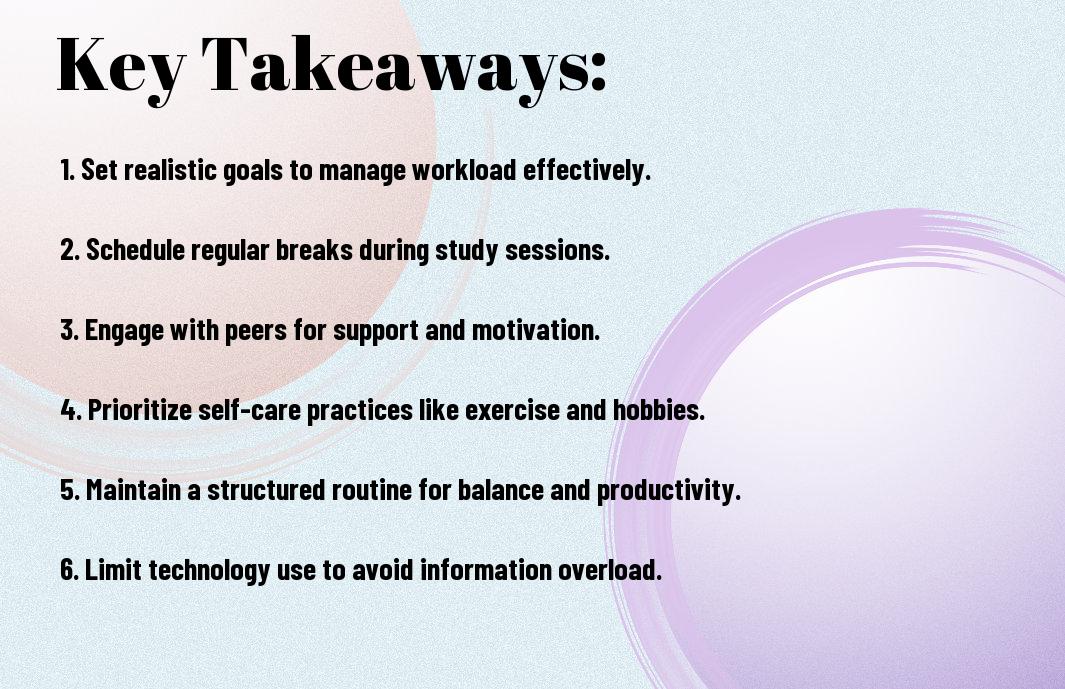You’re investing time and effort into your online education, but the isolation and constant screen time can take a toll on your mental and physical health. You need to find ways to maintain your productivity and motivation without exhausting yourself. Your goal is to learn and grow, not to burn out. You’ll learn how to set boundaries, prioritize self-care, and stay focused to achieve success in your online educational journey.
Key Takeaways:
To maintain productivity and well-being in online education, consider the following points:
- Set boundaries between work and personal life to avoid the blurring of lines that can lead to burnout in online learning environments.
- Establish a schedule and stick to it, allowing for regular breaks and time for self-care to manage workload effectively.
- Prioritize self-care activities, such as exercise, meditation, or spending time with family and friends, to maintain mental and physical health.
- Seek support from instructors, peers, or online communities when facing challenges or feeling overwhelmed to prevent burnout.
- Stay organized and manage digital distractions by using tools and strategies that help minimize procrastination and maximize focus on learning objectives.

Setting Boundaries
Before plunging into online education, you need to establish clear boundaries to maintain your mental and physical well-being. This involves creating a dedicated space for learning and separating your work from your personal life.
Establishing a dedicated workspace
Behind your computer screen, a clutter-free and organized workspace awaits. You will set up a dedicated area for learning, free from distractions and interruptions, allowing you to focus on your online education.
Separating work and personal life
After logging off from your online courses, you will close the door to your workspace, leaving your work behind. You will create a clear distinction between your learning time and personal time, allowing you to recharge and relax.
It is imperative to stick to your schedule and avoid the temptation to work or study during your personal time. You will prioritize self-care activities, such as exercise, meditation, or spending time with loved ones, to maintain a healthy work-life balance and avoid burnout in online education.

Time Management
Even with a flexible online schedule, you can quickly fall behind. Set clear goals and deadlines to stay on track.
Creating a schedule
Timing is everything when it comes to online education. You create a schedule that works for you, including dedicated blocks of time for studying and breaks.
Prioritizing tasks
Across your coursework, you will have multiple tasks competing for your attention. You focus on the most important ones first, tackling them when you are most alert.
Tasks that require the most effort and attention should be your top priority. You identify these tasks and tackle them first, ensuring you make progress on your most challenging assignments. This helps you stay on top of your workload and avoid last-minute cramming.
Staying Engaged
Once again, your approach to online education will determine your level of engagement. You need to find ways to stay motivated and focused to achieve your goals.
Finding motivation
Above all, you must identify what drives you to learn. You will find that setting clear expectations and celebrating small victories helps to boost your motivation.
Setting achievable goals
After establishing your motivation, you will need to set specific, achievable goals. You should prioritize your objectives and create a schedule to help you stay on track.
But as you set your goals, you will realize that breaking them down into smaller, manageable tasks is key to success. You will be able to track your progress and make adjustments as needed, which will help you stay focused and motivated throughout your online education journey.
Taking Breaks
All online students need to take breaks to avoid burnout. You can find tips on how to avoid burnout in college to help you manage your time effectively.
Importance of self-care
Around your daily routine, you should prioritize self-care to maintain your mental health. You need to take care of your physical and emotional well-being to stay focused.
Relaxation techniques
About relaxation, you have various options to choose from, such as meditation or deep breathing exercises. You can use these techniques to calm your mind.
For instance, you can start with simple exercises like taking a few minutes each day to breathe deeply, focusing on your breath, and letting go of your thoughts. You can also try progressive muscle relaxation, where you tense and then relax different muscle groups in your body. This can help you release physical tension and calm your mind, allowing you to focus on your studies and avoid burnout.
Seeking Support
Many online students overlook the importance of seeking support, but it’s important for avoiding burnout. You can find help from various sources, including peers and instructors, to maintain your well-being and academic success.
Connecting with peers
On top of managing coursework, connecting with peers can provide a sense of community and help you stay motivated. You can join online forums or discussion groups to interact with fellow students and build relationships.
Reaching out to instructors
Like peers, instructors can offer valuable guidance and support when you need it. You can contact them via email or video calls to discuss your progress and address any challenges you’re facing.
Considering your instructors’ experience and expertise, they can provide personalized advice and help you develop strategies to manage your workload and avoid burnout. You can ask them about additional resources or support services that may be available to help you succeed in your online course.
Staying Organized
After enrolling in an online course, you need to establish a routine to stay on top of your work. This means creating a schedule and sticking to it, setting aside dedicated time for studying and completing assignments.
Keeping track of assignments
Keenly monitoring your assignments and deadlines is vital to avoid last-minute rushes. You can use a planner or calendar to keep track of upcoming deadlines and stay organized.
Managing digital tools
Diligently utilizing digital tools can help you stay organized. You can use apps and software to manage your time, organize your notes, and stay connected with your instructors and peers.
The digital tools you choose should be intuitive and easy to use, allowing you to focus on your studies rather than wasting time figuring out how to use them. You should explore different options to find the ones that work best for your needs, and use them consistently to stay organized and on track.
Summing up
Conclusively, you’ve learned how to navigate the challenges of online education without sacrificing your well-being. To maintain your physical and mental health, prioritize self-care and set realistic goals. For more guidance, visit Burnout in Online Learning: Prevention Strategies to ensure your online learning journey is successful and sustainable, allowing you to reach your full potential.
FAQ
Q: What are the signs of burnout in online education, and how can I identify them?
A: The signs of burnout in online education can be subtle, but common indicators include feeling exhausted, detached, or cynical about your coursework, experiencing reduced performance, and lacking motivation. To identify these signs, take regular self-assessments, seeking feedback from instructors or peers, and acknowledge any physical, emotional, or mental strain you may be feeling. Regularly reviewing your goals and adjusting your study habits can also help in early detection of burnout.
Q: How can I manage my time effectively to avoid burnout in online education?
A: Effective time management is key to avoiding burnout in online education. This can be achieved by creating a structured schedule that balances study sessions with regular breaks, ensuring you have time for rest, exercise, and social activities. Utilizing planners, calendars, or apps can help organize your time and set realistic goals for each study session. Prioritizing tasks, avoiding procrastination, and setting aside dedicated times for checking and responding to emails or discussion boards can also significantly reduce stress and workload.
Q: What strategies can I use to maintain motivation and engagement in online courses to prevent burnout?
A: Maintaining motivation and engagement in online courses requires a proactive approach. Setting clear, achievable goals for each course and celebrating the completion of modules or assignments can provide a sense of accomplishment and motivation. Engaging actively with the course material, such as participating in discussions, asking questions, and seeking help when needed, can also enhance learning and prevent feelings of isolation. Additionally, connecting with classmates through group projects or study groups can foster a sense of community and support, making the learning experience more enjoyable and interactive.

